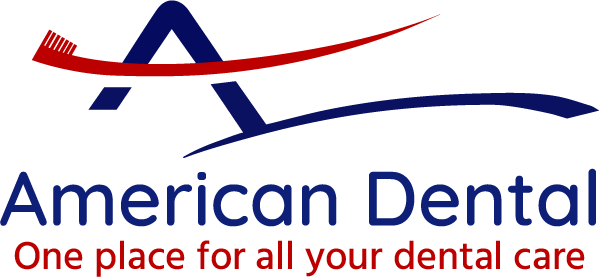If you’ve ever seen an ad for toothpaste, you’ve probably heard terms like “plaque” and “tartar” being thrown around. Indeed, both of these substances can be found in build-up around the teeth and gums, but these terms are not interchangeable. The words plaque and tartar both refer to specific substances with very different properties, and while both can cause oral health issues, the process of removing each one from the mouth is completely different. Wondering what the difference is between plaque and tartar? The team at American Dental has some information for you that can help better understand the natural processes that go on inside your mouth so you can have healthier teeth and gums.
Regular brushing and flossing can help remove plaque, a soft, sticky layer of bacteria that continuously builds up on your teeth and can be eliminated if caught early. On the other hand, tartar is the result of plaque that remains on teeth and solidifies over time through a process known as mineralization. Tartar is more tenacious and contributes to more severe problems like gum disease, whereas plaque can cause cavities and gum inflammation.
Tartar, in contrast to plaque, requires professional cleaning by a dentist or hygienist and cannot be removed at home. Although both substances are harmful to your oral health, you can prevent buildup by taking the appropriate precautions if you know how they form and how they differ from one another.
A general dentist in Chicago can give you a routine checkup to remove plaque and tartar or even assist you with cosmetic dentistry.
What is Plaque?
Whether or not you are aware of it, there is a whole world living inside your mouth! The human mouth is home to millions of microorganisms, including bacteria and fungi that aid in digestion and the development of your gut biome. While these microorganisms are generally not harmful to you, they can cause problems when their populations get out of control. As bacteria go through their life cycle, they live, die, reproduce, and produce some acidic byproducts.
The excessive accumulation of dead bacteria and their byproducts produces a sticky film which is known as plaque. This film builds up on every surface in the mouth, but it is especially prevalent in hard-to-reach areas like the spaces in between the teeth and along the gumline. Prior to the invention of oral hygiene, your saliva would wash away a portion of the plaque and live bacteria coating your mouth, and that process still occurs today. Luckily, with the help of your toothbrush, toothpaste, dental floss, and mouthwash, you can even more effectively control the population of microorganisms inside your mouth. With a robust daily oral health routine, you can easily remove most plaque from your mouth to prevent it from irritating the gums and damaging your tooth enamel.
What is Tartar?
While tartar does come from plaque, they are not the same thing, and removing tartar is much more difficult. When plaque is not removed from the mouth, it becomes infused with calcium from the saliva through the same natural process that rebuilds lost minerals in the tooth enamel. Unfortunately, the calcified remnants of your mouth bacteria can cause serious problems when they are in prolonged contact with your soft gum tissue. Tartar irritates the gums, causing them to recede, which exposes the vulnerable tooth roots. This can cause pain and bleeding in the gums, and it gives bacteria ready access to the tooth roots and to your bloodstream. This can lead to tooth decay and infections. It can even cause you to lose your teeth if left unchecked.
Unlike plaque, tartar is a hard substance that becomes strongly attached to the teeth. As such, it generally can’t be removed with a toothbrush or with floss. Instead, you will need the assistance of your dentist and dental hygienist to remove plaque.
Dental Checkups in the area
While tartar buildup sounds scary, it shouldn’t be a problem as long as you follow your daily oral health routine and visit the dentist every six months. During your routine cleaning, your dental hygienist will use specialized instruments to remove all traces of plaque and tartar from your mouth, including any that is located in hard-to-reach places.
When you’re done with general dentistry in Lincoln Square, you will be able to feel the difference immediately! Call American Dental today!

